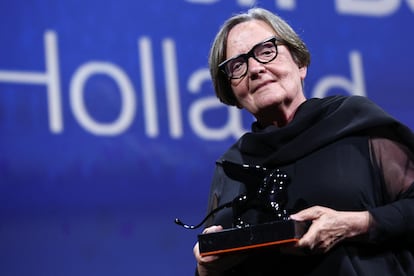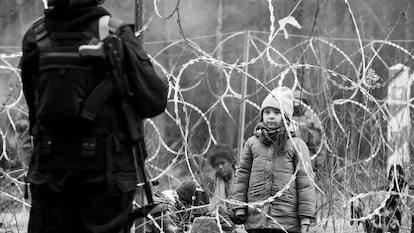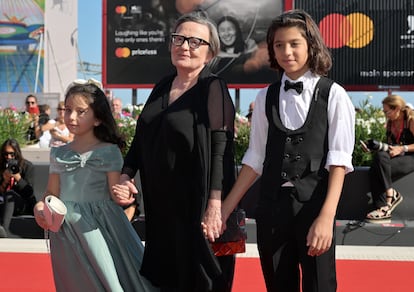Polish government accuses filmmaker Agnieszka Holland of ‘Nazi propaganda’ in refugee film
The ultra-conservative government says the director ‘hates her country’ for her portrayal of the humanitarian crisis on the Belarusian border in the film ‘Green Border,’ which has enjoyed box-office success

Agnieszka Holland has been compared to both Stalin and Hitler, though some have also said that she serves the Russian president, Vladimir Putin. She has been accused of hating her country, betraying it and insulting her compatriots. She has come under fierce criticism from members of the government and also from demonstrators, in some street protests. This has been so bad that Holland, who resides in France, was forced to cut short her recent trip to her homeland of Poland and hire an escort for the duration of her stay. “Nothing like this has ever happened in a democratic country. I am a filmmaker,” she says on the telephone. Her profession is the cause of her ordeal, after the release of her latest film, Green Border.
A “shameful, repulsive and disgusting” piece of work, said Jarosław Kaczyński, president of the ultraconservative Law and Justice (PiS) party, who has xenophobic leanings and is the de facto leader of the Polish government, before the film’s premiere in the country. However, Green Border won the Special Jury Prize at the recent Venice Film Festival. It has also recorded the best opening in the country’s cinemas for a Polish film in 2023: some 137,000 admissions, according to the specialized website Deadline. “In a way, they’ve given me publicity. It’s not a commercial film that could expect a huge attendance. I doubted if it could affect anyone or create debates, something that only happens with series and their bubble, hardly ever with cinema. My film is difficult. So all this is important, even if it comes at a cost,” explains the director.
As Holland brings to the screen the atrocious human suffering that still plagues hundreds of Syrians or Afghans, Belarus allows them to cross into Poland. However, from the other side, they are pushed back. And so on, until the back and forth becomes a limbo, or kind of hell, for those who die there, amidst the cold, hunger, and dehydration. The black and white cinematography, the ambitious approach of using several perspectives (from the refugees, the soldiers, the activists, the neighbors), the impressive directing and the humanitarian nature of Green Border were some of the highlights of the film at the Venice Film Festival.
One of the movie’s uncomfortable reflections is that as a dictator like Belarus’ Aleksandr Lukashenko uses migrants as a weapon to exert pressure on Europe, it seems that the old and supposedly welcoming continent is acting like a tyrant by getting rid of them. After the turmoil in Poland, the issues multiply. It turns out that, in the peaceful and democratic EU, an admired veteran film director may fear for her personal safety and feel compelled to hire a security guard because of a feature film she made.
“It was a precaution. If the prime minister, the president, the head of Justice, the party leader and whoever else make such terrible accusations, you can expect anything,” says Holland from France in a telephone interview with EL PAÍS. However, the director prefers to highlight the public’s response: the unexpectedly high attendance, the spectators who stand up to applaud in the cinemas, the letters she has received. So much so that she says she is “overwhelmed.”
However, she does not conceal the other side of the story. “The authorities have started a pogrom,” she says. The daughter of opposers of the communist regime, who was arrested during the 1968 protests, criticized for films such as Europa, Europa, and forced to flee Poland because of her work, believes she has never faced anything like this before: “Those of today are more united and more shameless.”

Jarosław Kaczyński, in particular, also vilified moviegoers and anyone who has dared to defend the film. Meanwhile, border soldiers have restored the slogan “only pigs sit in the cinema,” which criticized those who went to cinemas during the Nazi occupation of Poland. President Andrzej Duda said last Wednesday that he was not surprised, since Green Border insults them. Holland herself also returns to that period, but for an opposing insinuation: “The invasion of Ukraine has been compared to the Civil War in Spain. What I don’t know for certain is whether we are more in 1936 or 1938.”
The fact is that the film has arrived in Polish cinemas in an extremely tense and polarized electoral environment. Kaczyński linked it to two of the central issues of his campaign: immigration and security. Since 2021, Putin’s crony Lukashenko has been using immigration to destabilize the EU and NATO countries with which Russia shares a border: Poland and, to a lesser extent, Lithuania and Latvia. As the crisis reached its worst, the Polish government decreed a state of emergency at the border to deny access to activists and journalists. Holland portrays what was going on while no one could see. She also depicts it in the run-up to the October 15 elections, where the ultra-PiS government hopes to secure a third consecutive term in office. “If they win, it will be the end of democracy,” says the film director.
In the film, Holland introduces true facts gathered from dozens of interviews, such as an episode in which a border guard breaks the inside of a thermos and then passes it to a refugee, who is cut by the glass as he drinks. Adam Bodnar, Ombudsman between 2015 and 2021, with the ruling PiS, who knows the work of activists and medical assistance teams and the human rights violations at the border well, believes the film is “almost like a documentary.”
In these images, the government sees an “unfair” attack that “harms” Polish institutions and law enforcement agencies and has decided to issue an announcement in cinemas before the screening of the film with its version of the “context of the hybrid operation,” the Interior Ministry announced. Several movie theaters have refused to show the film. For Bodnar, a renowned lawyer and academic specializing in human rights — who is running for the Senate on the lists of Civic Coalition, a group of liberal parties — the government’s reaction is an attack on freedom of expression. “It is not a government concerned with protecting rights, especially political and civic rights,” he recalls, before denouncing “the instrumentalization and use of the film as a political weapon by the government.”

“In the Third Reich, the Germans produced propaganda films depicting Poles as outlaws and murderers. Today they have Agnieszka Holland for that,” said Polish Justice Minister Zbigniew Ziobro, on the social network X (formerly Twitter), when the film was screened in Venice, without having seen it. Holland explains that she is in the process of finalizing the lawsuit against the politician: she does not want to add “more fuel,” so she decided to focus her legal response only on Ziobro, as a “symbolic” gesture. She also believes it to be “anti-Semitic” and offensive to her Jewish origins.
Polish public television, controlled by the government, has also launched a campaign against the film and its director. Mentions of Green Border reached 77 million in the 24 hours prior to last Friday’s premiere, according to the daily Rzeczpospolita. On X, many users call the screenwriter “Leni Holland,” in reference to the Nazi director and propagandist Leni Riefenstahl. It remains to be seen whether such an uproar led to another setback for Green Border on Monday: the Polish Film Academy chose to send DK Welchman and Hugh Welchman’s The Peasants as its national Oscar nominee. However, judging by the reviews of the animated work, there seem to be strong artistic reasons to defend this decision.
In addition, the premiere coincides with the emergence of another border scandal for the government. Poland has once again come under the scrutiny of Brussels, which is demanding more information for allegedly allowing 250,000 migrants to obtain valid work visas to move throughout the EU and for being complicit in a system of bribery in embassies and consulates. In any event, the ultra-conservative party has run two election ads on the immigration issue with references to the film.
One of them is directly targeted at Holland and features the minister of justice and mixes images of Hitler and Stalin. The narrative that many citizens who will not see the film believe thanks to propaganda is the one being spread by the government, starting with Kaczyński. “Those who make that kind of film, those who support them, those who welcome them, are simply Putin’s soldiers: we have to say this plainly,” says the politician.
Conversely, the director is not sure what effect, if any, her film will have on the electoral campaign. It may be that it will serve the government to mobilize its voters, “with hatred, rage, xenophobia.” Or it may contribute to the debate against it. Yet, she is not intending to participate too much at the same time: “I don’t make films to fight for the elections. The role of culture is not to advocate for one party or another, but to raise awareness of the existence of an issue and its moral dimension. Seeing refugees with human faces, instead of numbers. When you hear the ideas of some governments it seems like a losing battle. But we have to keep going.” She has ultimately poured her life and her films into it.
So much so that in Venice she called for a minute’s silence for all the people who died betrayed by Europe along its borders. She also blamed the EU for not being willing to help but being able to. “It is pursuing a policy of burying its head in the sand. This is an issue that is impossible to solve easily. But so much fear from the rise of populism and of the far right does not work. Just look at what is happening in Italy [the mass landings these days in Lampedusa], because Tunisia releases all those who, in theory, it receives money for holding. We become sensitive to the blackmail from any dictator,” she now explains.
At the end of Green Border, a message reminds us that the number of dead bodies lying on the ground probably increased while the audience was watching the film. Holland maintains that one of the comments she is receiving reads: “After the film, we can no longer pretend we haven’t seen it.” Certainly, her film leaves a mark, something that even the Polish government would agree on.
Sign up for our weekly newsletter to get more English-language news coverage from EL PAÍS USA Edition
Tu suscripción se está usando en otro dispositivo
¿Quieres añadir otro usuario a tu suscripción?
Si continúas leyendo en este dispositivo, no se podrá leer en el otro.
FlechaTu suscripción se está usando en otro dispositivo y solo puedes acceder a EL PAÍS desde un dispositivo a la vez.
Si quieres compartir tu cuenta, cambia tu suscripción a la modalidad Premium, así podrás añadir otro usuario. Cada uno accederá con su propia cuenta de email, lo que os permitirá personalizar vuestra experiencia en EL PAÍS.
¿Tienes una suscripción de empresa? Accede aquí para contratar más cuentas.
En el caso de no saber quién está usando tu cuenta, te recomendamos cambiar tu contraseña aquí.
Si decides continuar compartiendo tu cuenta, este mensaje se mostrará en tu dispositivo y en el de la otra persona que está usando tu cuenta de forma indefinida, afectando a tu experiencia de lectura. Puedes consultar aquí los términos y condiciones de la suscripción digital.








































